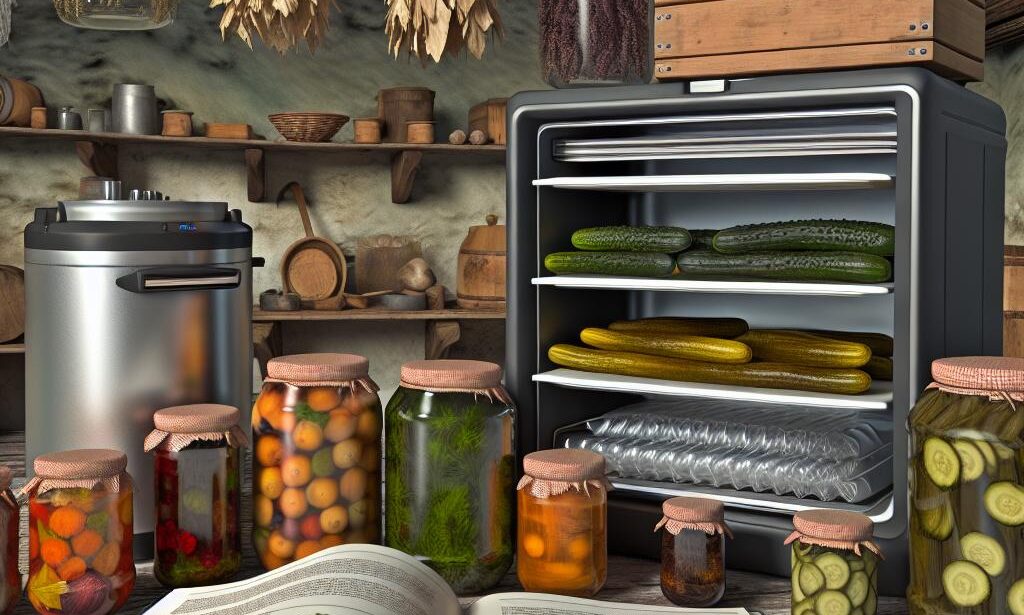Long-term food preservation is a crucial skill for anyone looking to stockpile food for emergencies, reduce food waste, or simply extend the shelf life of their favorite ingredients. In this article, we will explore the essentials of long-term food preservation, including various methods, tips for success, and the importance of proper storage techniques. Whether you are a seasoned prepper or just looking to make your groceries last longer, understanding these key principles will help you make the most of your food supply.
Table of Contents
- Essentials of Long-Term Food Preservation
- Types of Long-Term Food Preservation Methods
- Factors to Consider When Choosing Long-Term Food Preservation Techniques
- Recommended Supplies for Long-Term Food Preservation
- Tips for Properly Storing Long-Term Food Supplies
- Q&A
- To Conclude
Essentials of Long-Term Food Preservation
When it comes to long-term food preservation, there are several key essentials to keep in mind to ensure the quality and safety of your stored food. One of the most important factors to consider is the method of preservation you choose. Whether you opt for canning, freezing, dehydrating, or another method, it’s crucial to follow proper techniques to prevent spoilage and contamination.
Another essential aspect of long-term food preservation is proper storage. Make sure to store your preserved food in a cool, dark, and dry place to extend its shelf life. Additionally, using airtight containers or vacuum sealing can help prevent exposure to oxygen, which can lead to food deterioration. Labeling your preserved food with the date of preservation and contents is also important for easy identification and rotation.

Types of Long-Term Food Preservation Methods
When it comes to preserving food for the long term, there are several methods that can be used to ensure food stays fresh and safe to eat for an extended period of time. These methods range from traditional techniques that have been used for centuries to modern technologies that have revolutionized the way we store and preserve food.
Some of the most common include:
- Canning: This method involves sealing food in jars or cans and heating them to destroy any microorganisms that could cause spoilage.
- Freezing: Freezing food can help to preserve it for months or even years by slowing down the growth of bacteria and other microorganisms.
- Dehydrating: Removing moisture from food can help to prevent the growth of bacteria and mold, making it last longer.

Factors to Consider When Choosing Long-Term Food Preservation Techniques
When considering long-term food preservation techniques, there are several factors that need to be taken into account to ensure the safety and quality of the preserved food. One important factor to consider is the type of food being preserved. Some foods are more suitable for certain preservation methods than others. For example, fruits and vegetables are often best preserved using methods such as canning or freezing, while meats and fish may be better suited to techniques like smoking or drying.
Another factor to consider is the storage conditions required for the preserved food. Different preservation methods may require specific storage conditions, such as temperature and humidity levels. It is important to choose a preservation technique that can be easily accommodated within your storage space and capabilities. Additionally, consider the shelf life of the preserved food and how long you need it to last.
Lastly, consider the cost and time involved in the preservation process. Some methods may require expensive equipment or ingredients, while others may be more cost-effective. Similarly, some techniques may require more time and effort to prepare and preserve the food. It is important to weigh these factors against the benefits of each preservation method to determine the best option for your needs.

Recommended Supplies for Long-Term Food Preservation
When it comes to long-term food preservation, having the right supplies is essential to ensure that your food stays fresh and safe to eat for an extended period of time. Here are some recommended supplies that you should consider investing in:
- Mason Jars: These are perfect for canning fruits, vegetables, and jams. Make sure to get high-quality jars that are designed for canning to ensure a proper seal.
- Vacuum Sealer: A vacuum sealer is great for sealing bags of dried fruits, nuts, and other snacks to keep them fresh for longer periods of time.
- Dehydrator: If you want to preserve fruits, vegetables, and meats by drying them, a dehydrator is a must-have tool in your kitchen.
| Supply | Use |
|---|---|
| Mason Jars | Canning fruits, vegetables, and jams |
| Vacuum Sealer | Sealing bags of dried fruits, nuts, and snacks |
| Dehydrator | Drying fruits, vegetables, and meats |
These supplies will help you preserve your food effectively and efficiently, allowing you to enjoy your favorite foods even when they are out of season. Make sure to follow proper food preservation techniques to ensure the safety and quality of your preserved foods.

Tips for Properly Storing Long-Term Food Supplies
When it comes to storing long-term food supplies, there are several key tips to keep in mind to ensure that your food remains fresh and safe for consumption. Proper storage is essential for preserving the quality and nutritional value of your food items. Here are some essential guidelines to follow:
- Choose the right containers: Opt for airtight containers such as Mason jars, Mylar bags, or food-grade buckets to keep out moisture and pests.
- Store in a cool, dark place: Keep your food supplies in a cool, dry area away from direct sunlight to prevent spoilage and maintain freshness.
- Rotate your stock: Be sure to use and replace your stored food items regularly to prevent them from expiring and going to waste.
Additionally, consider investing in a vacuum sealer to extend the shelf life of your food supplies even further. By following these tips, you can ensure that your long-term food storage remains effective and reliable for when you need it most.
Q&A
Q: What are the benefits of long-term food preservation?
A: Long-term food preservation helps extend the shelf life of food, reduces food waste, and ensures a stable food supply during emergencies or natural disasters.
Q: What are some common methods of long-term food preservation?
A: Common methods of long-term food preservation include canning, freezing, dehydrating, pickling, and fermenting.
Q: How can I properly store canned foods for long-term preservation?
A: Canned foods should be stored in a cool, dark place with a consistent temperature. It is important to regularly check for signs of spoilage, such as bulging lids or off smells.
Q: What types of foods are best suited for freezing for long-term preservation?
A: Foods with high water content, such as fruits, vegetables, and meats, are best suited for freezing for long-term preservation.
Q: How can I safely dehydrate foods for long-term preservation?
A: To safely dehydrate foods for long-term preservation, it is important to use a food dehydrator or oven set to a low temperature. Foods should be properly prepared and stored in airtight containers.
Q: What are some tips for pickling and fermenting foods for long-term preservation?
A: When pickling and fermenting foods for long-term preservation, it is important to use the proper ratio of salt to water, ensure a clean and sterile environment, and monitor the fermentation process closely.
To Conclude
In conclusion, understanding the essentials of long-term food preservation is crucial for ensuring food security and sustainability. By utilizing proper techniques such as canning, freezing, and dehydrating, individuals can extend the shelf life of their food supplies and reduce waste. It is important to carefully follow recommended guidelines and safety precautions to maintain the quality and safety of preserved foods. By incorporating these practices into your food storage routine, you can be better prepared for emergencies and enjoy the benefits of having a well-stocked pantry. Remember, proper food preservation is not only a practical skill but also a valuable investment in your future well-being.

